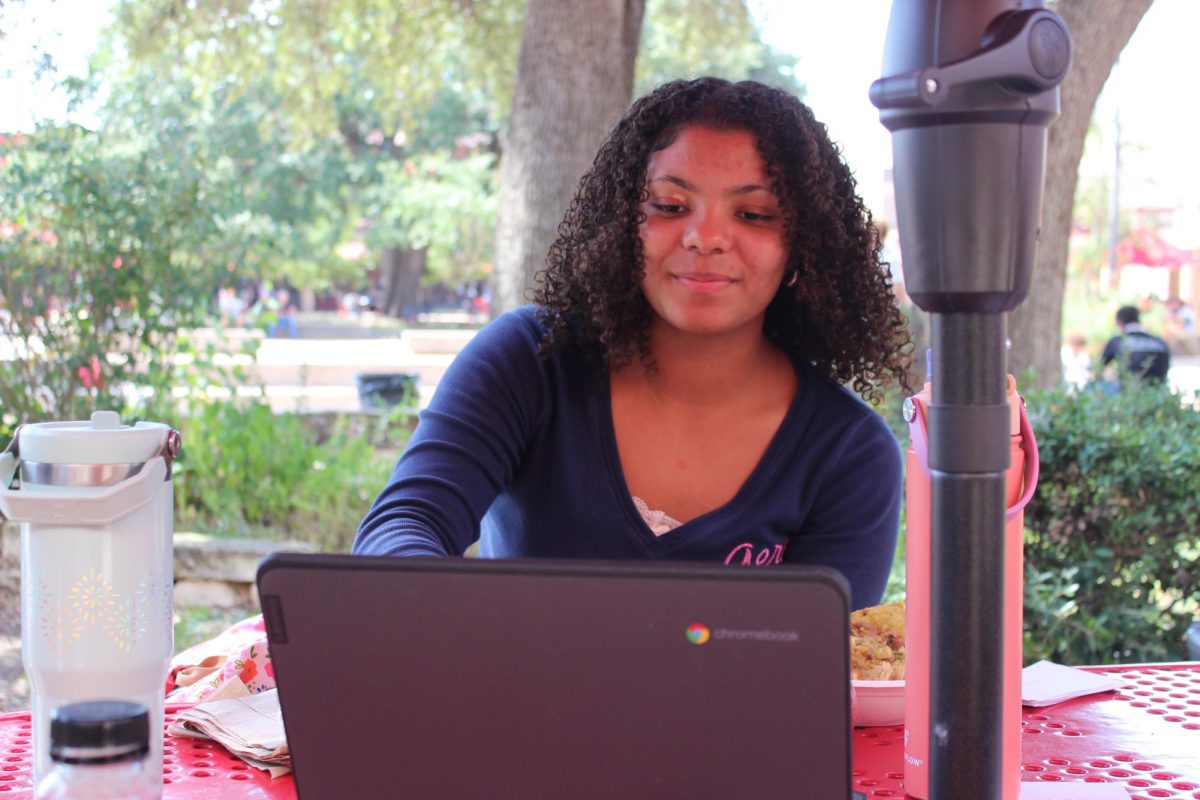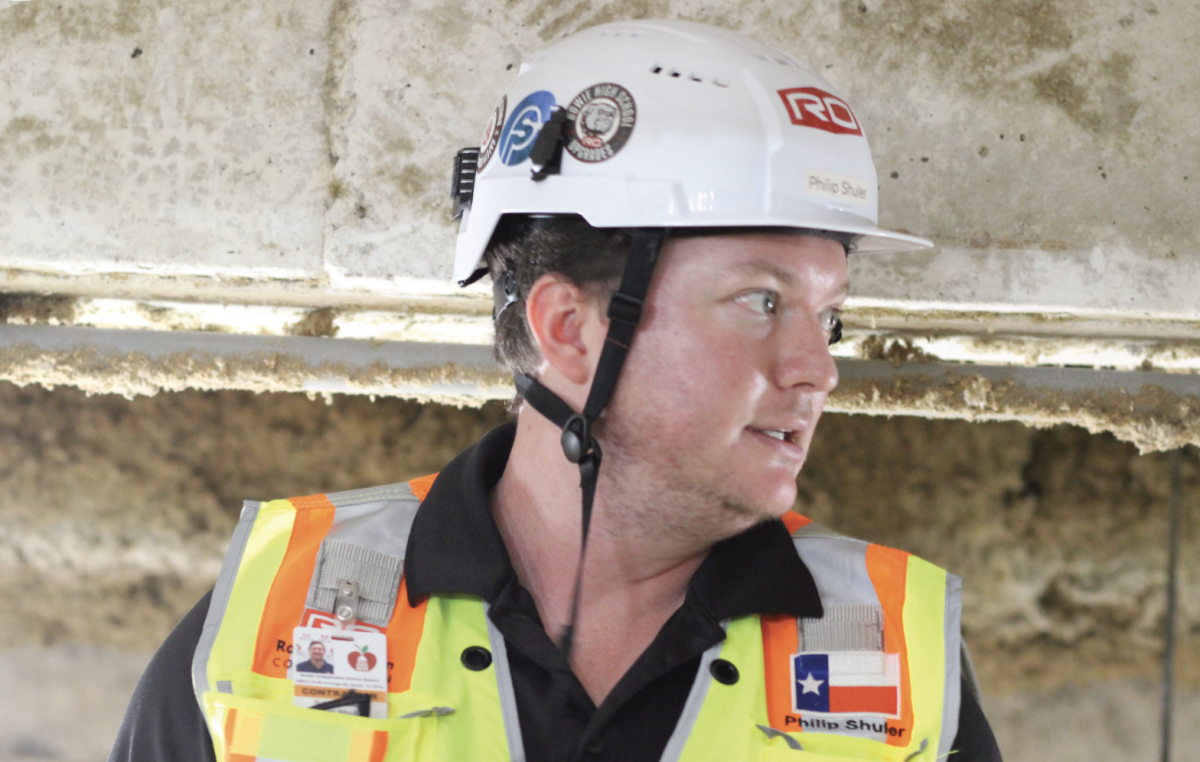Imagine sitting in class one day focused on your work and then being interrupted by a blaring announcement. ‘We are now on hold’. Your teacher stops what they’re doing and checks that the door is locked. It’s supposed to be “business as usual” with no students leaving or entering classrooms until the hold is over.
No one in the room knows what’s going happening, or when the hold will end. The hold could mean a few things, there’s an altercation in the hallway, a medical issue that needs attention, unfinished maintenance that is being done in a common area, or that federal agents are on campus and are looking for a student or staff member. The latter scenario is something AISD has been preparing for.
As President Donald J Trump beings his second term, he has begun following up on his campaign promises, including the start of mass deportations for undocumented immigrants. One action Trump has taken during his presidency to help these deportations take place is removing the policies that had previously prevented migrant arrests from taking place in sensitive locations such as churches and schools.
In response to this, AISD has taken action in preparing district faculty on what to do if federal officers enter campus and what steps families should take if they are here illegally.
“The district has created what is called a Family Separation Hub, it provides resources specifically for teachers, administrators, and families,” Academic Director Kaylin Brett said. “It is just to provide support to students who need support and so we have what’s called in the district, parent support specialists that we could parents can reach out and say I’m needing support in this area we have, and they basically provide ways to support them.”
According to Brett, the only way students can access this hub is if they talk to a counselor or a teacher or if their parents contact the school asking for resources. Once a student or a guardian contacts a staff member asking for help, the staff member then can connect the family with specific resources based on what they need. Brett explains that AISD’s legal counsel has created the hub and is constantly updating it.
“The Family Separation Hub was built by our legal team and our communications team in the district, so they are keeping up with executive orders, keeping up with any policies, and making adjustments based on that,” Brett said. “Because the executive orders are constantly changing we also reach out to our district and ask how we can help a specific student or family to ensure that we’re able to offer the most recent and accurate information.”
AISD also sent out an email to staff and families that contained resources such as a FAQ page for families and talk points for teachers. Brett believes that these talking points can help teachers navigate difficult conversations with students.
“If a student feels nervous, let them come talk to a counselor or a teacher,” Brett said. “Having the fear that they could go to school and someone could come take them, definitely creates a sense of unsafeness for certain students.”
The email sent out to families was a completely separate thing from the Family Separation Hub that was created for staff members only. The hub is designed to help staff support families with specific needs related to recent immigration legislative orders, and the email was sent out to provide direct resources for families and staff trying to navigate these difficult times.
“All of my teachers have always been just like, good support systems in general, with anything, especially with mental health,” senior Julia Perez* said. “I think that the letter that the district sent out was very helpful, and I feel like people have been already mentally preparing for what’s to come by keeping up with the news and doing their research.”
AISD policy states that they do not collect immigration status for families, meaning the district has no knowledge about the legal status of students. According to Brett, if a student confides in a counselor or teacher about their or their family’s immigration status, that information is legally protected, and staff members cannot disclose that information to any federal officers. This protection is similar to doctor-patient confidentiality.
“In Austin ISD, we do not collect immigration status. That is a piece of identity that we don’t collect and so we don’t know who is facing these fears and who’s not unless they confide in us,” Brett said. “We have a lot of students who are afraid that other students are going to report them, or other students are going to say something, and that would go under our Austin ISD bullying and harassment policy, and would follow those consequences too.”
One of the scenarios AISD has been preparing for is if a parent doesn’t pick up their kid after school or if a student goes home and their parents are not there. If this situation does arise for a student, Brett explains that a Student Resource Officer (SRO) would be contacted and would work directly with Child Protective Services to ensure that the student is getting their needs met such as making sure they have a place to sleep and food to eat. AISD’s Student Resource Officers are available all day, including after school or on weekends by calling 512-414-1703.

“I do think if a student doesn’t get picked up and or they go home and their parents are not there, they’re going to be afraid to stay in that house,” Brett said. “And so I think our community is so supportive and anytime we have a student in need, the amount of support that comes out blows my mind and so I do know, the immediate action would be Student Resource Officers, CPS, and then helping problem solve with that child individually, based on if they do have other family members around or what needs are required at that time.”
Since the Trump Administration removed the policies that protected schools from being infiltrated by federal agents, AISD has prepared an extensive procedure if a federal agent were to enter campuses looking to speak with or arrest a specific student. According to Brett, if a federal agent enters campus the first thing that the admin team would do is scan the badge and send it to AISD’s legal counsel.
“So, if an agent comes in and provides us their badge, I’m supposed to then scan that and send it to our legal team, then [the federal agents] have to provide us with their action plan which would involve the individual that they’re seeking information on,” Brett said. “And so while that’s being reviewed, they are to wait in the front office, and then once I hear back from the legal team, if it is request for student information, or for parent or for staff information,I then have to go by based off of what our legal team tells us to do.”
Brett describes that if this situation were to happen, the entire school would be placed on hold while the legal team reviews the situation and advises admin on what to do. While badges and paperwork are being reviewed, federal officers are not allowed to leave the office and enter the main campus until admin authorizes them to do so. Senior Kamryn Reyes feels that the campus will not be a safe place if federal agents are allowed to enter.
“I think it’s just going to make school in an unsafe place, and I feel like there’s already so many elements that make school an unsafe, like the potential for shootings and drugs and other kinds of violence,” Reyes said. “And now you have to worry about school being a place where you are taken from your home and your family, and that is really not something that kids should have to be worried about.”
According to The 74, a non-profit news agency that covers U.S. education, the fear students may be experiencing with federal agents entering schools could cause more tension in classrooms and be disruptive to all students, whether they’re concerned about their personal safety or not. Consequently, in The Hechinger Report author Jennifer Rich advises teachers to talk about difficult topics such as immigration in order to foster open discussions and teach students to disagree respectfully. Perez disagrees with this concept.
“I feel like teachers shouldn’t advise students on what to do and if they want more information, they should research it themselves,” Perez* said. “But I have total empathy for families that are going through a difficult time right now and at the same time I feel that something needs to be done because its not fair for people to come into this country illegally.”
According to AISD, teachers may take part in political events regarding national issues outside of their role as a teacher, and they can prepare lessons on current events as long as they include both viewpoints on that event and help facilitate respectful behavior in the classroom. Similarly the Inter-cultural Development Research Association describes 10 ways schools can help support students such as affirming safe spaces for students and equip staff with training and resources to help support students. Reyes agrees with this and feels that Bowie could be doing even more outreach for students needing support.
“There could be more announcements that are less cautious as far as addressing the safety of students or a club could be started just so that kids could talk to other people about how they’re feeling support each other,” Reyes said. “I definitely think that our counselors should be open to kids coming in and expressing their concerns and make it known that counselors have the time for students to come talk to them so that they don’t feel like scared to bring up their concerns. A lot of my AP teachers have been very gently open, like, not aggressive at all, but about their own feelings and, just trying to tell us, hey, this is going to be hard, but we’re here for you and I think other teachers should do this too.”
*Julia Perez is a fictitious name that was generated to protect the identity of a source who asked not to be identified due to concerns related to sharing their political views.







